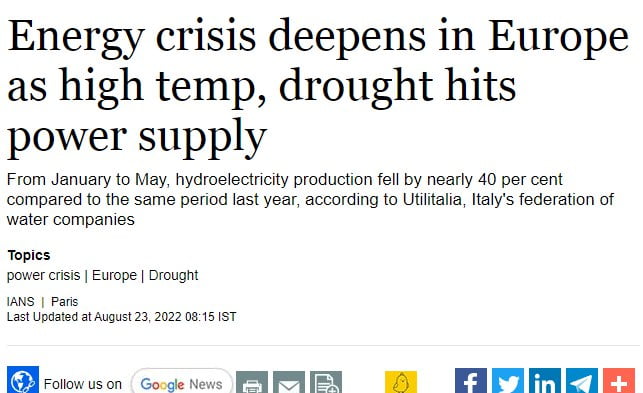The so-called alleged climate crisis has exacerbated Europe’s energy crisis this summer affecting electricity production at a time when European economies are already dealing with historically high oil and gas prices.
Because river temperatures were too high to cool the plants several nuclear power plants in France Europe’s largest producer of nuclear power were forced to reduce output. Hydropower which uses a dam or diversion structure to alter the natural flow of a river or any other body of water has also taken a hit. In July France experienced a nearly 84 percent rainfall deficit on average. Only 4 TWh of hydroelectricity was produced in June the lowest level ever recorded for the same period as river and lake stock dropped to their lowest levels in more than 20 years.
“Electricite de France (EDF) reported in August that in the Rhone Valley the Alps and the Cote d’Azur region which account for more than 70 percent of the country’s hydropower capacity hydroelectricity generation has fallen by 60 percent since January this year.”[1]
The situation in Italy is not much better. According to Utilitalia Italy’s federation of water companies hydropower production fell by nearly 40% from January to May 2022 compared to the same period last year.
Norway Europe’s leading electricity exporter with a 137.9 TWh of hydroelectricity output last year is preparing a framework for limiting electricity exports. Hydroelectric power exports from Norway which have been marketed as “the battery of Europe” and a major alternative to the absence of Russian gas are falling short of this promise due to “half-empty” water reservoirs.
The level of filling in Norwegian water reservoirs was 67.9% at the end of July significantly lower than the corresponding 77.7% at the same time of year from 2002 to 2021. According to the latest report from the Norwegian Water Resources and Energy Directorate the lowest occupancy rate of 50.4% was seen earlier this month in southwestern Norway (NVE).
In an effort to address the worsening situation of rising prices affecting Norwegian consumers Norwegian oil and energy minister Terje Aasland stated that the government was prepared to take additional action if the situation worsened. This action could include storage requirements for reservoirs export restrictions or both.
In Germany coal power production has been hampered by sinking Rhine waters which have made shipping along the river more difficult. According to a local shipping company while the water was still navigable boats could only carry about a quarter of their capacity. Uniper one of Germany’s largest energy supply companies said two of its coal plants in Western Germany may operate irregularly until early September due to insecure coal supplies.
[1]https://www.business-standard.com/article/international/energy-crisis-deepens-in-europe-as-high-temp-drought-hits-power-supply-122082300039_1.html

